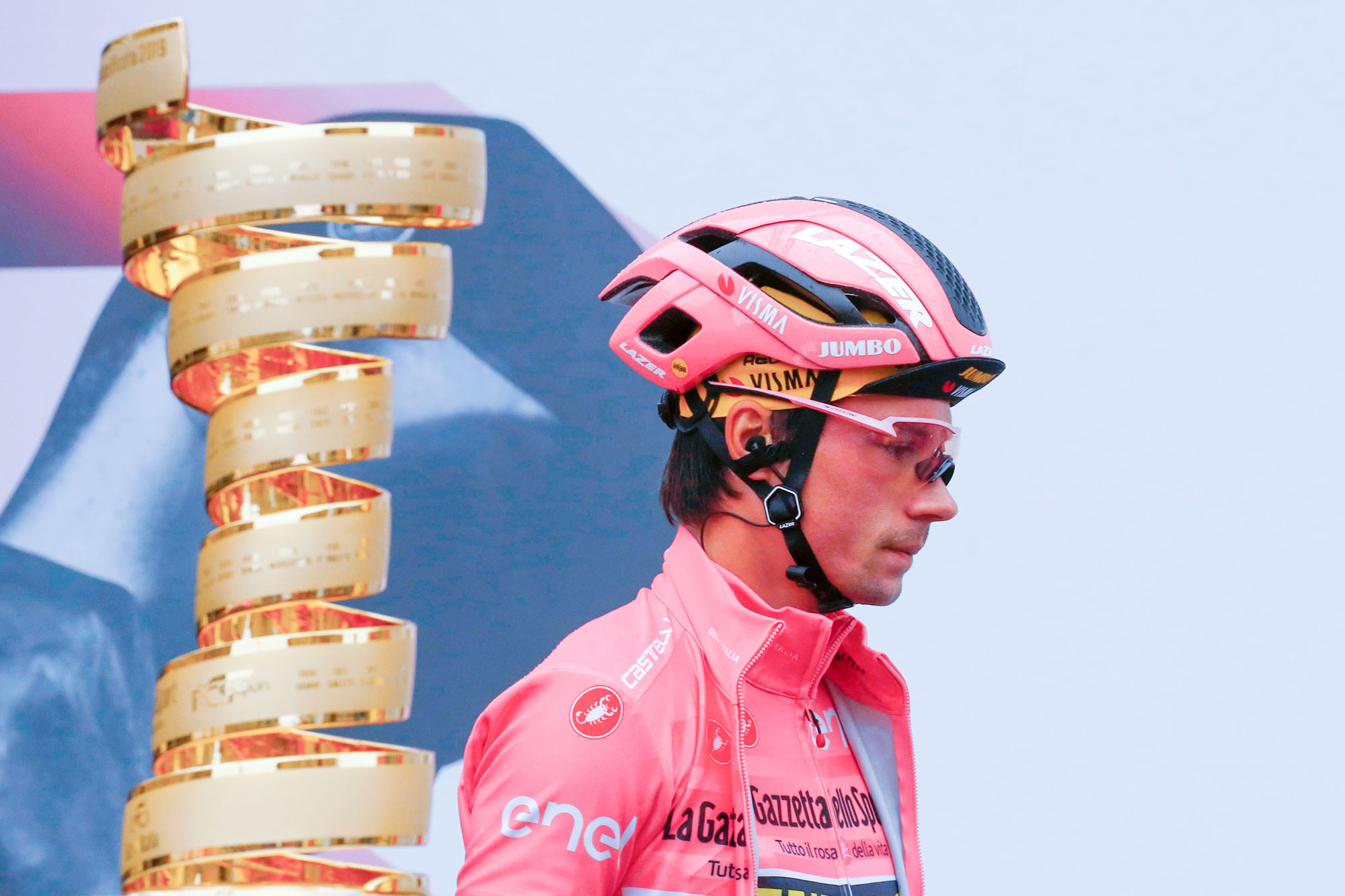
It could be at the Giro d'Italia race headquarters, or as they wait for their names to be called out at the team presentation or even just before they roll down the stage 1 time trial start ramp this weekend.
But wherever the two headline contenders of the 2023 Giro d’Italia actually first cross paths in this year’s race, Primož Roglič and Remco Evenepoel's most recent encounters were much more frequent and not nearly as glamorous as you could perhaps imagine.
For a hefty percentage of the month of April, in fact, Roglič and Evenepoel were both holed up in the Mount Teide Parador hotel in the Canary Islands for altitude training. Every morning, as Roglič recalls, and most evenings, as the two diligently laid the daily bricks of the foundations of their 2023 Giro d'Italia bids, they would briefly see each other en route to the restaurant or in the buffet queue itself and greet each other. Then they'd head on.
To judge from the way he's grinning when he discusses these chance encounters, Roglič – still on Teide when he gives this interview, two days after Evenepoel has conquered Liège-Bastogne-Liège for a second time – can see there's a funny, if slightly surreal, side to them.
After all, as Roglič knows very well, when the two roll down the start ramp in the Fossacesia Marina to kick off the Giro d'Italia in less than a week's time, they'll be fighting for rather more than the last piece of lettuce or cucumber in the Teide Parador salad bar.
"We'd see each other in the mornings and then some dinners," Roglič recalls, in an interview where his flashes of quiet, laconic humour shine through as much as the seriousness with which he's taking his second Giro d'Italia GC bid, and his chance to take his fourth Grand Tour.
"But on the road, when we were training, we were 'hiding' from each other, we were each training by ourselves." Then he deadpans: "We'll see enough of each other over the next three weeks."
Nor were there any 'friendly' games of table tennis or cards in the hotel lounge between the two top rivals to while away the long, tedious evenings on the Canary Islands volcano, he said: "No, no, it's all focus, focus at these camps. It's all train-travel-repeat."
So disappointingly – at least for the media – neither Roglič nor Evenepoel made any attempt to out-psyche each other off the bike prior to the main event in May, despite multiple opportunities for psychological warfare in the Canaries. This was confirmed by Evenepoel, too, who has described their Teide encounters as 'polite five-minute conversations' at most.
A different approach path
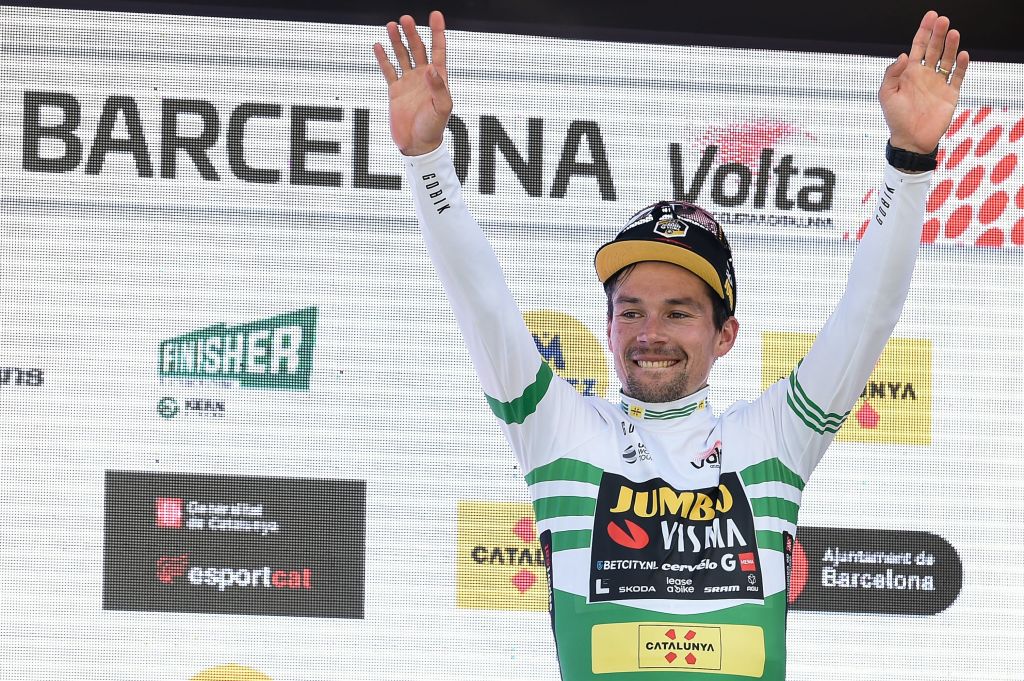
Instead of obsessing with his rival's performances, instead Roglič has opted for the classic approach of concentrating on his own progress towards the Giro. And if you want to draw one conclusion from the 33-year-old spending a scarily long seven weeks in Spanish altitude camp, training each day between two and seven hours, it'd be how seriously he's taking his approach to his twelfth Grand Tour.
"I'm ready," Roglič says when asked to sum up the results of spending most of March and April in Teide. "We did everything we wanted here in the camp and we just need to get through the last days before the start and then we are good to go."
There is, he insists, no long-term fall-out from the operation to cure his right shoulder's propensity for dislocation over the winter, either - and he even does a little 'windmill' gesture with his arm for the benefit of the interviewers, as if to show he's not kidding.
But if his approach to the 2023 Giro is very different to his build-up in 2019, with Catalunya in late March, rather than Romandie in late April, as his last race, he replies with a classic Roglič catchphrase of 'we will see, huh?' when asked if he feels any better for the radical switch in training strategy.
"I don't feel, anyway, that this was low intensity, Catalunya was more than intense enough," he reasons. "So we'll just work on having a nice build-up and then I can start the Giro."
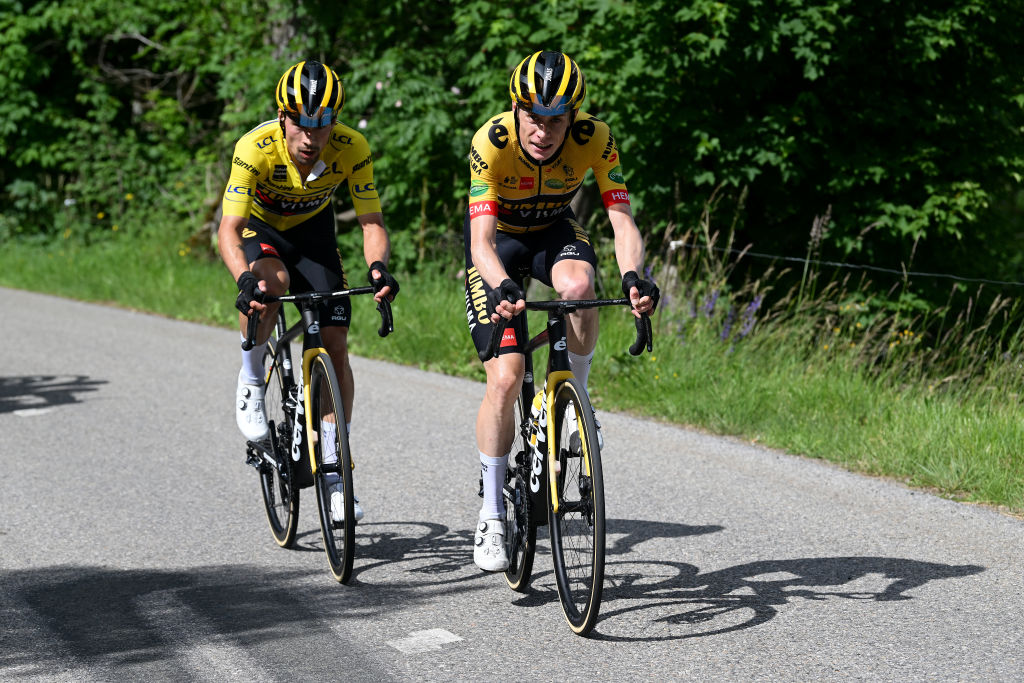
His Jumbo-Visma teammate Jonas Vingegaard has opted to miss out on all one-day races in 2023, with some observers saying this way the Dane avoids taking unnecessary risks. Given what happened to Tadej Pogačar in Liège the day before he talks to Cyclingnews, that may seem prescient.
However, Roglič says his decision not to race in the one-day Classics had nothing to do with staying safe, arguing, "If you start thinking like that, then you'd never start any at all. Risks are always there.
"But just looking at what I want still to hunt and focus on, we decided on this program, also that this should be my comeback after a while away.
"So I stand behind the things that we did and now I can patiently wait for the start."
Never one to talk too much about his plans, Roglič is unforthcoming even by his own standards about how he feels he can fare on the Giro's 70km of time trials. But that's perhaps explainable by the fact that he has barely raced against the clock this year, just a total of 11.5 kilometres in Tirreno opener. (For the record, he finished twelfth).
"We will see, huh?" he says, "we will see how fast we are. I don't know much about the Giro's time trials, we'll see when I'm there."
"I know the roads from the last time trial the best, though, of course, I've been there, I was skiing there a lot of times because it's super close to Slovenia. But we always went up by gondola, and now we're going down by gondola. This time we'll go up with by bike."
"The Giro is the closest race to our country too, so from what I know from previous experience, there'll be lots of Slovenian supporters there that day. So it'll be nice to come to that part of the race and do that last TT there."
Given Roglič knows only too well what it means to lose a Grand Tour on the last day of a race in a time trial after his experiences in September of 2020 in the Tour de France, you'd imagine he doesn't want to have to play it all on the final day.
But, curiously enough, he is markedly neutral about whether he thinks the brutally hard uphill stage 20 time trial could be pivotal for the whole 2023 Giro. Rather he says, it's the whole third week that counts.
"There are all sorts of options in this race, but the fact is that stage 1 is a GC day, there will be minutes or seconds or whatever between the guys. Then after that, it's a new day all the way and every day. We won't know who's ahead and who's behind until the end of the race, and for sure it will be a spectacular finish. The hard stages, 18, 19, 20 – every day they're going to be changing the game."
Remco – and the rest
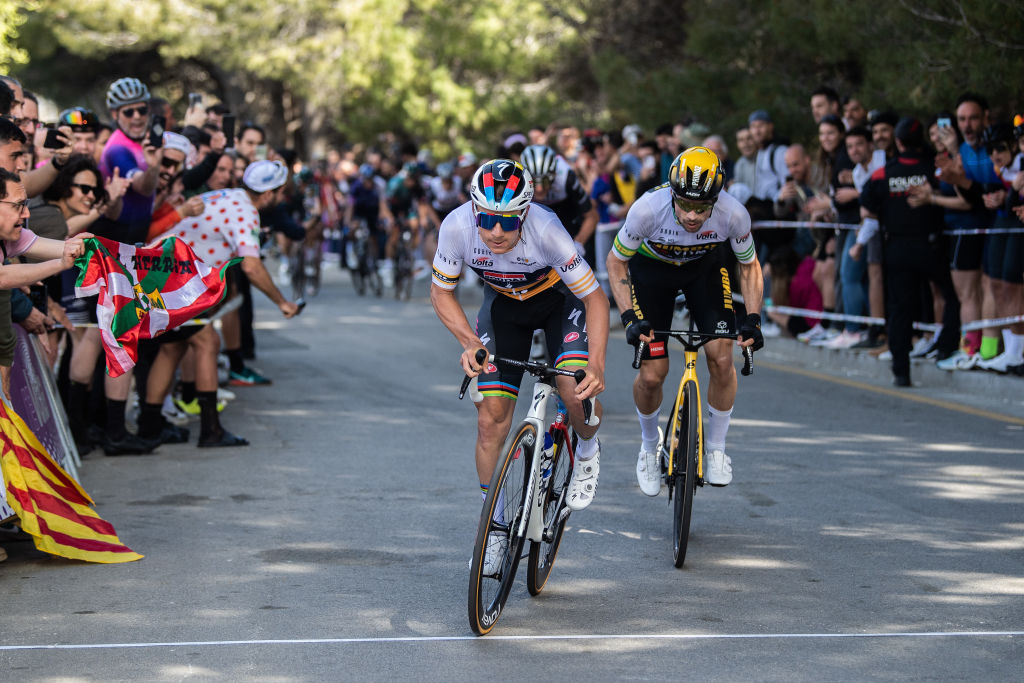
When it came to this year's Liège, Roglič was a spectator himself, albeit watching the race he won in 2020 on TV and from a distance. When it comes to the top rival for the Giro, he agrees that Evenepoel was clearly on top of his game, "so no surprises at all," he adds with his usual laconic humour.
However, he nods his head vigorously when it's pointed out that he can't afford to focus only on the Soudal-QuickStep leader when it comes to the Giro.
"I have always said that Remco is a great rider, and I have to be at my very best to compete with him. So we'll try to look for that, day after day, and at the end, we'll see what that means in the result," he says.
"But if we race only against each other, then somebody else can take the opportunity and benefit," he warns, before agreeing that the last thing he wants is a repeat of the 2019 Giro.
Four years ago, he and Vincenzo Nibali were watching each other so closely, they allowed Richard Carapaz to fly under the radar until, suddenly, it was too late to stop the Ecuadorian claiming pink for good.
"That's what I mean," Roglič acknowledges when reminded of how, having won the two opening time trials in Italy in 2019 and looking like the remainder of the race would a victory procession in all but name for him, things promptly unravelled big time in the third week.
One team, co-headed by a former Giro d'Italia winner and a former Tour de France winner, that could threaten the Roglič-Evenepoel dynamic of the race is Ineos Grenadiers. Tao Geoghegan Hart's victory in the Tour of the Alps, coupled with rising form for Geraint Thomas could provide a serious joint challenge, Roglič recognises.
"I didn't really watch the Tour of the Alps, but I also raced against Tao in Tirreno and he was very strong already there. So I didn't need any confirmation of what he can do."
"Tao won the Giro as well, G won the Tour and they're very motivated. Everyone" – meaning every potential rival – "is someone, huh? They [Thomas and Geoghegan Hart] don't need to prove they can win the Giro."
"So I just need to focus on myself, and do my very best, and we'll see what that brings."
Back to his roots
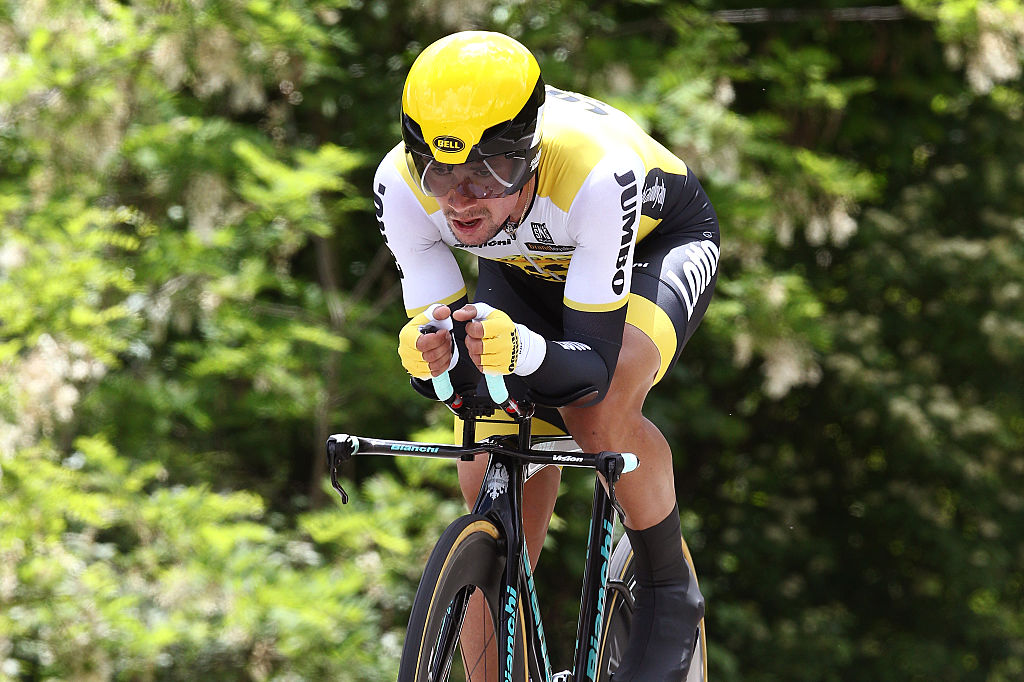
He's equally non-committal about whether losing time to Evenepoel on stage 1's time trial could in fact be useful, as it would enable him to stay behind the Belgian. Rather he opts to be fatalistic about it, saying "everything that happens, I have to take the positive from it. Everything is good for something."
Roglič's laid-back, matter-of-fact attitude to his racing these days stands in marked stark contrast to the extremes of his results in Grand Tours. Even his third place in the 2019 Giro, his breakthrough GC result, was a rollercoaster and since then he's either won and completely dominated proceedings in the process, as happened in the 2019, 2020 and 2021 Vueltas or he's had some brutal misfortune - witness his crashes and abandons in the 2021 and 2022 Tours and the 2022 Vuelta.
Only once, in the 2020 Tour, has he finished somewhere in the middle, and even then, the radical switch of narratives, from being comfortably en route to victory to having the ground pulled out under his feet by Pogačar at the last possible moment, contained huge amounts of drama.
He hints that the unpredictability of his Grand Tour experiences made it easier to return to the Giro d'Italia rather than focus directly on the Tour, saying "It's the safest to start with first Grand Tour then you have other possibilities to go on, eh?"
But, given the Giro was where it all began for him in Grand Tours when as a barely known racer he claimed victory in the Chianti time trial in 2016, and its proximity to Slovenia, you can't help feeling that for Roglič, going back to the Giro is going back to his cycling roots.
"It's got a special place in my heart," Roglič acknowledges. "It's a special race, the first victory I had in a Grand Tour was here, and we're so close to Slovenia, it's almost our home race. When I started to dream of being a cyclist, the Giro was what I was aiming for.
"For sure, it's different now compared to then. There was the period of 2016, when I was starting out, then in 2019 I started to compete with the best, and now I'm coming here with all these experiences. So I can be, how can I say, more relaxed than I was at the start."
The most recent part of that Grand Tour backstory was at the Vuelta 2022, of course, when he looked to be heading to take on Evenepoel in the third week, only for a dramatic crash see him poleaxed and out of the race. But the Slovenian refuses to see the Giro as a potential remake or part 2 of a 'Remco v. Roglič' series, even if his exit, bloodied and concussed, had all the feel of a potential cliffhanger.
"Ha, we'll see, eh?" he says by way of comment on the idea. "But no, it's completely a different story, a different race, like I said, I need to focus on myself, do my very best."
So even if there clearly is some unfinished business at the Vuelta after last year's 'what-if' exit, he won't be drawn on the idea of whether he'll head to Spain for a fourth, record-equalling bid this autumn, or if a Giro victory would be the last part of the jigsaw in terms of what he wants to achieve as a racer.
"We'll answer this one on the last day, huh?" he replies. "It [the Giro] is part of that, part of my goals, part of my goals for life, too." As for the Vuelta 2023, "the Giro is first. We do it on the day by day and then after that we can put a line under it and decide on the future."
What is clear, he says, is that when he does reach Rome on May, is the celebrations will begin, with his deadpan explanation of the post-race junketing only making it sound marginally less appetising.
"Normally you don't ride the bike much or drink water or any of those isotonic drinks: this is replaced by beer," he says with only the smallest of grins escaping at the prospect. "We also eat the things normally don't eat so much in this period of racing, like hamburgers. To have a bit of a change, yeah?"
But rather than beer for isotonic drinks or burgers for pasta, now, though, Roglič is hoping for much bigger changes of direction, like returning to the trend of 2019, 2020 and 2021, when every setback he had, either in the Giro or Tour, was compensated with a Grand Tour victory in the same season.
There's also the prospect of setting the record straight on the Giro d'Italia and a race which seemed in his grasp until it all went awry in the final third of 2019. For Roglič, in fact, the 2023 Giro represents a chance to move away from his greatest three-week success story to date, at the Vuelta, and grasp a different kind of Grand Tour victory: it won't be his last chance, but it's certainly his best one for now.
In that at least, for all they're separated by a decade and at very different points in their careers, Roglič and the man he has regularly been encountering in a hotel breakfast room on the Canary Islands for the last couple of months have an awful lot in common. Whoever finally fares the better as a result of all that work on the Teide, we'll find out in a little over four weeks' time.







